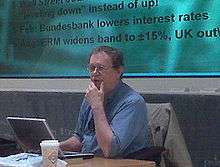Harry Cleaver
Harry Cleaver Jr. (21 January 1944) is an American scholar, Marxist theoretician, and professor emeritus at the University of Texas at Austin. He is best known as the author of Reading Capital Politically, an autonomist reading of Karl Marx's Capital. Cleaver is currently active in the Zapatista movement in Chiapas, Mexico.[3]
Harry Cleaver Jr. | |
|---|---|
 Cleaver lecturing at the University of Texas at Austin | |
| Born | January 21, 1944[1] |
| Nationality | American |
| Occupation | Professor emeritus[2] |
| Academic background | |
| Education | Ph.D. |
| Alma mater | Stanford University[3] |
| Thesis | 'The Origins of the Green Revolution[4] (1975) |
| Doctoral advisor | John G. Gurley[4] |
| Academic work | |
| Discipline | Economics |
| Sub-discipline | Marxian economics, Autonomist Marxism |
| Institutions | University of Texas, Austin, The New School[3] |
| Notable works | Reading Capital Politically |
Education
Cleaver began his undergraduate studies at Antioch College in 1962, graduating with a bachelor's degree in economics in 1967. At Antioch, Cleaver became involved in the American Civil Rights Movement and began his lifelong engagement with political activism.[3] From 1964–65, Cleaver studied abroad at the University of Montpellier where he engaged with the Union Nationale des Étudiants de France. In 1967, Cleaver enrolled at Stanford University to begin a Ph.D. in economics. While at Stanford, Cleaver was active in the Anti-war Movement. As a student activist opposed to the Vietnam War, Cleaver protested the Stanford Research Institute's alleged connection to the United States Department of Defense, which became the impetus for his dissertation research into the connections between the Green Revolution and social engineering.[5][6] Cleaver's frustrations with mainstream economic theory during this period in his studies led him to embrace Marxism.[3]
Career
Teaching
In 1971, Cleaver was hired as an assistant professor at the Université de Sherbrooke in Montreal, Quebec where he taught for three years, finished his dissertation, and studied Québécois nationalism. From 1974 to 1976, Cleaver was a visiting assistant professor at the New School for Social Research in the department of economics. In 1976, Cleaver took a position in the economics department of the University of Texas at Austin where he would teach for 36 years, retiring in 2012.[7]
Partial bibliography
| Library resources about Harry Cleaver |
| By Harry Cleaver |
|---|
Books
- Cleaver, Harry (2017). Rupturing the Dialectic: The Struggle Against Work. Chico: AK Press. ISBN 978-1849352277.
- Cleaver, Harry (1979). Reading Capital Politically. Austin: University of Texas Press. ISBN 978-0292770157.
Articles
- Cleaver, Harry (1998). "The Zapatista Effect: The Internet and the Rise of an Alternative Political Fabric". Journal of International Affairs. 51 (2): 621–640. JSTOR 24357524.
- Cleaver, Harry (1996). "The "space" of cyberspace: Body politics, frontiers and enclosures". Women & Performance: A Journal of Feminist Theory. 9 (1): 239–247. doi:10.1080/07407709608571263.
- Cleaver, Harry (1994). "Kropotkin, Self-valorization And The Crisis Of Marxism" (PDF). Anarchist Studies (2): 119–135. Retrieved 8 June 2016.
- Cleaver, Harry (1989). "Close the IMF, abolish debt and end development: a class analysis of the international debt crisis". Capital & Class. 13 (3): 17–50. doi:10.1177/030981688903900102.
- Bell, Peter; Cleaver, Harry (1989). "Marx's crisis theory as a theory of class struggle". Research in Political Economy. 5 (5): 189–261.
- Cleaver, Harry (1977). "Malaria, the Politics of Public Health and the International Crisis". Review of Radical Political Economics. 9 (1): 81–103. doi:10.1177/048661347700900106. PMID 11615136.
- Cleaver, Harry (September 4, 1976). "Political Economy of Malaria De-Control". Economic and Political Weekly. 11 (36): 1463–1473. JSTOR 4364910.
- Cleaver, Harry (March 27, 1976). "Internationalisation of Capital and Mode of Production in Agriculture". Economic and Political Weekly. 11 (13): A2–A5+A7–A16. JSTOR 4364488.
- Cleaver, Harry (1972). "The Contradictions of the Green Revolution". The American Economic Review. 62 (1/2): 177–186. JSTOR 1821541.
References
- Cleaver, Harry (May 2009). "Curriculum Vitae for Harry Cleaver". Harry Cleaver Homepage. Retrieved June 6, 2016.
- "Faculty Bio - Harry Cleaver Jr". The University of Texas at Austin - College of Liberal Arts. Retrieved June 6, 2016.
- Cleaver, Harry. "Policy Activism". Harry Cleaver Homepage. Retrieved June 6, 2016.
- Cleaver, Harry McBeath Jr. (1975). The Origins of the Green Revolution (Dissertation). ProQuest Dissertations Publishing. ProQuest 302779342.
- Cleaver, Harry. "Research". Harry Cleaver Homepage. Retrieved June 8, 2016.
- Cleaver, Harry (March 1, 1972). "The Contradictions of the Green Revolution". The American Economic Review. 62 (1/2): 177–186. JSTOR 1821541.
- Cleaver, Harry. "Teaching". Harry Cleaver Homepage. Retrieved June 8, 2016.